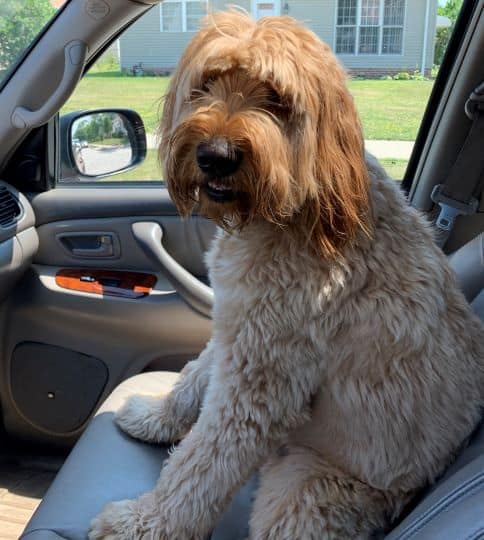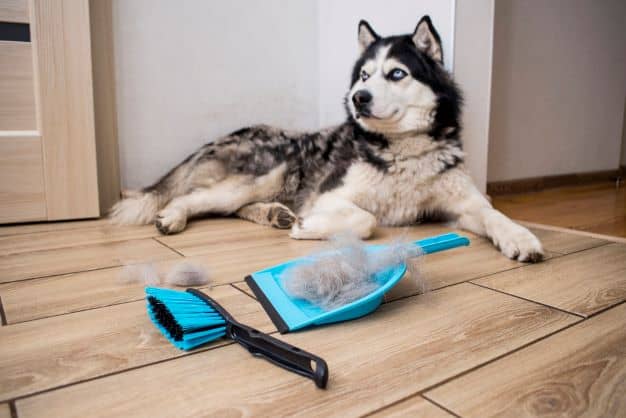I love my dog. She’s part of the family. She makes me laugh, makes me take walks (whether I like it or not) and brings joy to the whole family. What isn’t great for the whole family is the additional dust and dander that comes from having a beloved furry friend in the home!

Thankfully there is technology available that provides both a simple and effective solution: your furnace filter. The AprilAire 2000 series whole house air purifier is one of the top filters on the market and the best furnace air filter for home with pets.
Unfortunately, this option is not feasible in every situation. This article will discuss why this AprilAire is the best for homes with pets, why it might not work for you, and some other good choices available.
What’s Wrong With a Little Dust and Dander?
The EPA has listed indoor air pollution as one of the top five environmental risks to public. Due to the amount of time we spend indoors, it is not surprising that many people suffer from asthma, allergies, and other respiratory problems.
When you see dust on your furniture or in the air you’re really seeing mold spores, pet dander, bacteria, pollen, and other airborne contaminants. In fact, about 40,000 dust mites can live in just one once of dust. In addition to what we can see is a disturbing concentration of harmful microscopic particles that are invisible to the human eye.
Clearly indoor air pollution is a problem in nearly every household but even more so in homes with pets!
Can a Furnace Filter Really Reduce Pet Dander and Dust?
Yes it can but first, it’s important to know some basics.
As you might have assumed, a furnace filter sifts the air that goes through your heating system. But what might surprise you is that it is not primarily for the purpose of keeping the indoor air quality of your home clean and safe. It is there to mainly keep your HVAC system in a good condition and working smoothly.
The primary function of a furnace filter is to capture unwanted air particles that may get into the internal mechanism of your HVAC system and compromise its performance.
Depending on the efficiency of the filter, the byproduct of this is that it improves your indoor air quality by blocking allergens from recirculating throughout your home.
These airborne particles also reduce energy efficiency. So in addition to increasing the air quality in the home, installing a high quality furnace air filter can help you to save some money on your heating bills (more money to spend on treats for your best friend:)
By working in conjunction with your home’s heating and cooling system, an air cleaner can deliver cleaner and healthier air throughout your home whenever your HVAC fan is on.
At the highest end, an air cleaner can provide up to 98% effectiveness at removing airborne particles as small as one micron – that’s 1/100th the diameter of a human hair. But let’s look at the stats of the AprilAire 2000 series I mentioned above.
That is more than adequate for controlling allergens in most homes whether you have a cat, dog, or beaver (I saw it on Tik Tok!)

Do I Really Need a Whole House Air Cleaner?
Not necessarily! It is the best protection but not the only protection. However, if you have pet allergies, asthma, or other respiratory illnesses it’s definitely worth giving serious consideration to having a whole house air cleaner professionally installed.
Why might it not work for you? Most often it is due to the price. A whole home air purifier must be installed by a licensed HVAC contractor and the price can be between $700 – $1500. Additionally, the filters are usually more expensive although they typically need less maintenance.
Another reason may be space constraints. Some heating and cooling equipment is installed in very tight closets or crawlspaces which would make installing additional equipment nearly impossible.
So what is your next best option?
Types of Furnace Filters to Decrease Dust and Pet Dander
The type of furnace filter to use will depend on the features that are specifically important to your family. And, of course, there are pros and cons to consider.
Fiberglass or synthetic filters may be the most basic and inexpensive, but its filtering capacity is not superior. HEPA filters are considered as the top-rated type, but it can reduce airflow significantly because of its superfine sifting material.
Let’s break down the most common types.
Fiberglass or Synthetic Disposable Filters
This is the most basic type of filter. Have a low price and are disposable. It keeps dirt and dust from accumulating on heat exchangers, fan motors, and other surfaces, keeping your system components clean and allowing full airflow.
If you’re looking for inexpensive disposable options this will be your top choice.
The downside of this particular type is that it can only prevent 80% of microscopic particles that are fifty microns or larger from entering your furnace or air conditioner.
This means that ultrafine particles that can have a negative impact on your health may continue to circulate around your home. If you are suffering from some kind of allergy or asthma, its best to consider using a more ultra-fine type of filter.
Pleated Air Filter
Usually made out of polyester, cotton, or paper, this type of pleated filter is an improvement over the fiberglass filter because it is better in trapping particulates. It eliminates 80% to 95% of larger particles that at least 50 microns in size.
This means that more pollutants are removed from the air circulating inside your home. This would be the best choice for anyone suffering from asthma, pet allergies, or similar sensitivities.
Electrostatic Filters
This filter uses electrostatic technology and charged plates. These washable filters actively attract and hold on to airborne particles as opposed to just trapping particulates as air passes through.
However, when dust builds up and covers the surface of the charged plates, it becomes insulated and will not be as effective. Regular maintenance of monthly washing the filter is the simple fix. But it can get tiresome.
HEPA Filters
(High Efficiency Particulate Air) This type of filter can trap 99% of particles that are at least 0.3 microns in size. This filter can easily trap allergens, fibers, lint and smoke. However, because of the smaller space that the air has to pass through, it will significantly reduce air flow.
HEPA filters don’t tend to be an option because of the amount of work required to adapt them to a ductwork system.
Best Choice for Your Home
When making your choice, the most important thing to look at is the furnace filter’s MERV rating (Minimum Efficiency Reporting Value). It’s an indicator of how well a filter works and the types of air particles it can trap.
For pet dander and allergies a filter with a MERV rating between 8 and 13 is recommended. Using an air filter with a MERV rating that’s too high is just as bad as using one that’s too low.
Air filters with higher MERV ratings can filter more, but the thickness of the filtration material can restrict airflow and can cause damage to the heating and air conditioning equipment.
A MERV 8 air filter can trap and block the following particles in the air:
- Pollen
- Dust mites
- Mold Spores
- Large dust particles
In most cases, a MERV 8 air filter is more than adequate. However, if you have respiratory issues or if you have pets, a higher MERV rating might be a good idea.
A MERV 11 air filter can trap and block the following:
- Pollen
- Dust mites
- Mold Spores
- Large dust particles
- Fine air particles
- Pet dander
- Lint fibers
- Smoke
- Smog
- Bacteria
MERV 11 air filters are a little more expensive than a standard filter, but a little higher price tag per filter is usually worth the added efficiency.
On average, MERV 8 filters remove 85% of large air particles and 50% of small particles. The higher you go the better the filtration will be, but we don’t recommend going higher than MERV 13. A MERV 13 filters 95% of large air particles and 80% of small particles without creating airflow issues.
Conclusion
That covers the basics and I hope it helps you make a decision on a new air filter for your home. But if you get stumped or have any additional questions please reach out to a trusted HVAC contractor. Most will give you a free estimate and will help you understand what filter will fit on your HVAC system.
If you want to read about another recommended furnace accessory, check out our article on furnace humidifiers.
